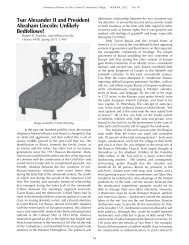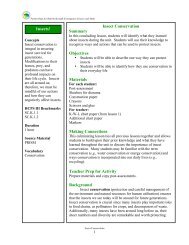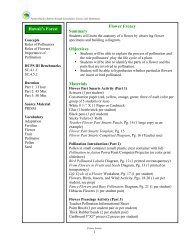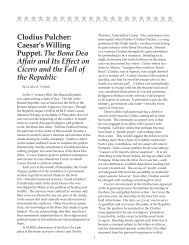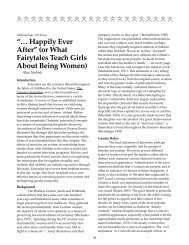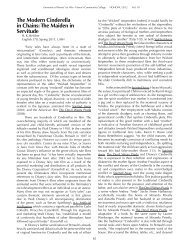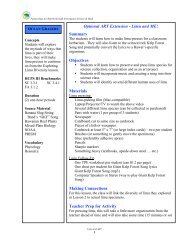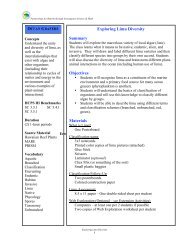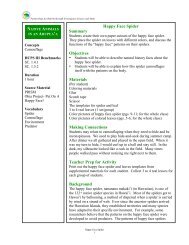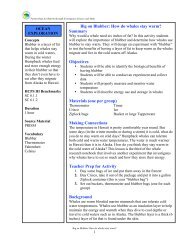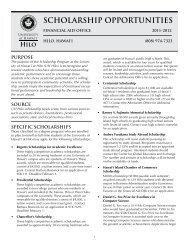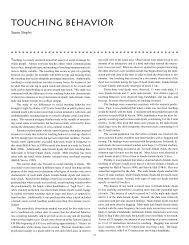A JOURNAL OF ACADEMIC WRITING VOLUME 8
A JOURNAL OF ACADEMIC WRITING VOLUME 8
A JOURNAL OF ACADEMIC WRITING VOLUME 8
You also want an ePaper? Increase the reach of your titles
YUMPU automatically turns print PDFs into web optimized ePapers that Google loves.
is unfair to ask them to either accept GMO food or starve.<br />
Accepting GMOs as food aid is a threat to African peoples’<br />
beliefs about food safety, even if those beliefs are a result of<br />
European influence. Donating cash aid instead of in-kind aid<br />
may not chip away at the mountains of surplus corn in the U.S.<br />
or open up a new market for GMOs, but it is arguably more<br />
manageable for the United States to accept this concession than<br />
it is for Africa to wait for food while they starve.<br />
Some experts argue that Africa was ultimately at fault for<br />
their own hunger because they folded to the E.U.’s wishes.<br />
Gerald D. Coleman, a Catholic clergyman and advocate<br />
of GMOs, argues in his article “Is Genetic Engineering the<br />
Answer to World Hunger?” that: “It was a moral disgrace that<br />
in 2002 African governments gave in to [GMO] opponents<br />
and returned to the World Food Program tons of [GMO]<br />
corn simply because it was produced by U.S. biotechnology.” 8<br />
Coleman’s assertion is misguided.<br />
The Zambian president Levy Mwanawasa explained, “the<br />
rejection is not intended to demean those who had donated<br />
it, rather it was done to protect the long-term interest of the<br />
Zambian people and the environment.” 9 Regardless of whether<br />
the U.S. or the E.U. is right about GMO food safety, it is a<br />
secondary issue to the more important economic relationships<br />
between Europe and Africa. After the 2002 crisis had subsided,<br />
Zambia started exporting non-GMO food, allowing its<br />
economy to begin the recovery process. 10 If GMO seeds had<br />
entered the Zambian agricultural sector through food aid,<br />
they would not have been able to export GMO-free food.<br />
Obviously, it was the right decision for Zambia to reject GMO<br />
aid. The U.S. must begin providing cash donations for food aid<br />
instead of in-kind aid while the debate over GMOs plays out in<br />
the developed world; or the U.S. must cultivate and separately<br />
store non-GMO food for emergencies.<br />
The United States eventually offered to mill the GMO<br />
corn for the African countries, yet Zambia still refused to accept<br />
it. Zambia claimed that “any health problems that might arise<br />
from eating GMOs would be too costly to address.” 11 The<br />
reasoning was that Zambian people consume much more<br />
corn than Americans do, suggesting that there is no scientific<br />
evidence to prove that a diet consisting of such an amount<br />
of GMO corn is safe. 12 In fact, many experts do claim that<br />
GMOs are unsafe to eat. One oft-cited study was conducted by<br />
Arpad Pusztai for the Rowett Research Institute. Pusztai found<br />
that GMO potatoes sometimes caused internal organ mis-<br />
8 Gerald D. Coleman, “Is Genetic Engineering the Answer to World<br />
Hunger?,” America, February 2005, 17.<br />
9 Lieberman and Gray, “GMOs and the Developing World: A<br />
Precautionary Interpretation of Biotechnology,” 404.<br />
10 Ibid, 404.<br />
11 Clapp, “The Political Economy of Food Aid in an Era of Agricultural<br />
Biotechnology,” 472.<br />
12 Clapp, “The Political Economy of Food Aid in an Era of Agricultural<br />
Biotechnology,” 473.<br />
96 - HOHONU Volume 8 2010<br />
development and weakened the immune systems of laboratory<br />
rats. 13 Proponents of biotechnology argue that Americans have<br />
been eating GMOs without incident, and that there is no nonrefutable<br />
proof that GMOs are unsafe. 14 Norman Borlaug, the<br />
1970 Nobel Peace Prize laureate and biotechnology advocate,<br />
argues that “To date, there is no reliable scientific information<br />
to substantiate claims that transgenic crops are inherently<br />
hazardous.” 15 However, there is no conclusive evidence that<br />
transgenic crops are inherently safe, according to a large section<br />
of the scientific community. Notably, most studies conducted<br />
on GMOs are funded by private institutions in developed<br />
nations. Asking Africa to accept GMOs into their diets and<br />
their economies is asking them to accept a product that their<br />
scientists have not been able to test with the same vigor as the<br />
developed nations. This problem did not escape Zambia. In<br />
response to the GMO aid that the U.S. offered, Zambia sent a<br />
small group of their scientists to study the issue. They traveled<br />
to the U.S., South Africa, and Europe, and concluded that<br />
GMOs should not be accepted. 16 The scientists determined<br />
that accepting the aid could endanger biodiversity in local<br />
corn varieties; that introduction of GMOs into Zambia could<br />
threaten the European export market; and that the U.S.’s<br />
claims of GMO safety were inconclusive, particularly regarding<br />
“toxicity, allergenicity and antibiotic resistance.” 17 Even if<br />
GMOs would be perfectly safe to consume, Zambia did not<br />
cave to the E.U.’s precautionary stance. They did their own<br />
research and decided the risk was too high. The U.S. must<br />
respect the fact that African countries have the right to adopt<br />
the precautionary principle.<br />
Beyond the issues of trade relations and human safety lies<br />
the threat of purposeful cultivation of GMOs in Africa. The<br />
typical small farmer in Africa cannot afford the licensing fees<br />
and expensive GMO seeds on a regular basis. This is proved<br />
time and time again by the fact that they so often need food aid<br />
because of crop failure. They certainly do not have the money<br />
to consistently renew licensing agreements or purchase GMO<br />
seeds. For example, several African farmers who purchased<br />
expensive GMO cotton seeds with the intention of increasing<br />
their production went into debt because the GMO yields<br />
13 Mae-Wan Ho et al., GMO Free: Exposing the Hazards of Biotechnology<br />
to Ensure the Integrity of Our Food Supply, (Ridgefield, Connecticut:<br />
Vital Health Publications, 2004), 22 and Roberto Verzola, “Genetically<br />
Engineered Foods Have Health Risks”, in Genetically Engineered Foods,<br />
ed. Nancy Harris (San Diego, CA: Greenhaven Press, 2004), 38.<br />
14 Florence Wambugu, “Why Africa Needs Agricultural Biotech,” Nature<br />
400. (1999): 15 and Norman Borlaug, “The Second Green Revolution,”<br />
in Agriculture, Human Security, and Peace: A Crossroad in African<br />
Development, ed. M.Taeb and A.H. Zakri (West Lafayette, Indiana:<br />
Purdue University Press, 2008), 150.<br />
15 Borlaug, “The Second Green Revolution,” 150.<br />
16 Clapp, “The Political Economy of Food Aid in an Era of Agricultural<br />
Biotechnology,” 479 and Zerbe, “Feeding the Famine? American Food<br />
Aid and the GMO Debate in Southern Africa,” 599.<br />
17 Zerbe, “Feeding the Famine? American Food Aid and the GMO Debate<br />
in Southern Africa,” 599-600.



